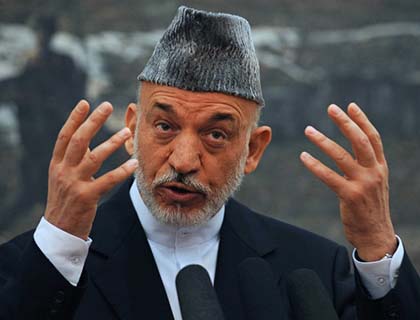With President Karzai’s persistence in his refusal to sign the bilateral security agreement between Afghanistan and the US, the opponents of the agreement are finding a louder voice in opposing the much crucial security agreement between Kabul and Washington. In recent weeks, as the standoff over a timely signing of the security pact has continued, the militant groups have lauded President Karzai for his refusal to sign the agreement, urging him to reject it altogether. And finally, Iran, who has vehemently opposed a prolonged presence of US forces in Afghanistan, stepped in, asking the Afghan government not to sign the security agreement that would allow presence of thousands of American troops in Afghanistan after 2014.
In the meantime, politicians, civil activists and ordinary people have been anxiously and closely watching the developments related to the standoff. A broad spectrum of Afghan politicians, parliamentarians and public figures have urged the government to avoid risking the bilateral security agreement with the United States and sign the deal as quickly as possible. Iraq, who failed to secure a deal allowing US forces remain the country, also joined calling on Afghanistan not to make a mistake. The visit of Iraq’s Foreign Minister to Afghanistan came in the right moment to urge the Afghan government to heed the calls for not failing the agreement.
While the Afghan government recognizes the importance of the bilateral security agreement with the US for the future of Afghanistan, all the recent developments suggest that the government may fall short of securing an extensively robust long-term partnership with the United States. In this case, Kabul and Washington may take a minimalist approach in shaping a long-term partnership and cooperation in security, economic and development areas between the two countries. At first place, everyone now is worried that the current standoff between Kabul and Washington is jeopardizing the agreement between Kabul and Washington. Still, if the Afghan government manages to sign the security agreement, it may not be something that Afghanistan desperately needs.
It is obvious that there is a flawed process of negotiating going on between Afghanistan and the United States. Both sides are using pressure tactics and threats for persuading the other side to accept their conditions. Though many of the demands of the Afghan government are logical and justified, the negotiating process would not bear a favorable fruit for a long-term and sustaining partnership between Afghanistan and the US that could be free of suspicions and distrusts. The two sides would only succeed to proceed with constructive negotiations if they are determined to resolve the issues through diplomacy, not threats and pressure tactics.
Perhaps the problems involved with the ongoing negotiations between Kabul and Washington lies in the different perspectives of President Karzai and that of the US. The Afghan President believes that the US is bluffing with the so-called ‘zero option’ in the negations and that Washington will stay here in Afghanistan at any conditions. However, many believe that the US may seriously start considering pulling out all its troops from Afghanistan as it did in Iraq. Time and again, the US has expressed exhaustion with the demands put forward by Afghanistan, hinting that it was ready to prepare for full withdrawal. The fact is that despite Barack Obama’s willingness to keep a portion of troops in Afghanistan beyond 2014, support in Washington from a prolonged Afghan mission has declined to the lowest point.
The North Atlantic Treaty Organization (NATO) has made it clear that it will keep its presence in Afghanistan only if the bilateral security agreement between Kabul and Washington is signed. It means if US completely withdraws from Afghanistan, all or most of NATO troops would leave the country. With withdrawal of foreign forces, the international aid would drop as the donor countries might not commit to funding Afghanistan. Obviously, this is not an option for Afghanistan at current stage given the dependency of Afghan security forces on foreign aid and military cooperation.
The fact that the militant groups laud the President and ask him to reject the security agreement is suggesting how thorny the way for a long-term partnership between Afghanistan and the United States could be. In the course of building a long-term partnership between the United States and Afghanistan, Afghan officials may falter between temptations of appeasing the Taliban with harder stance against Washington or gaining international support. Afghan officials know well that signing the agreement is crucial for the future of the country and for sustaining its military and economy. However, in the decision-making process, some officials in inner circles of the presidency may weigh in favor of overture to the Taliban no matter what might happen to long-term partnership between Afghanistan and its international allies.
This rare instance must have come as surprising for President Karzai who has persistently called on the Taliban to come into negotiations with the Afghan government. Previously, President Karzai has been criticized for his leniency towards the Taliban who routinely been targeting Afghan forces and other government and public installations. In another move, President Hamid Karzai is set to visit Iran and India. Despite insistence of the Afghan government that the trip has nothing to do with the security agreement with Washington, the United States may not be comfortable with the timing of the visit. The most recent trend of developments is not a good sign for the negotiations between Kabul and Washington that is supposed to secure a long-term and sustaining partnership between the two countries.

